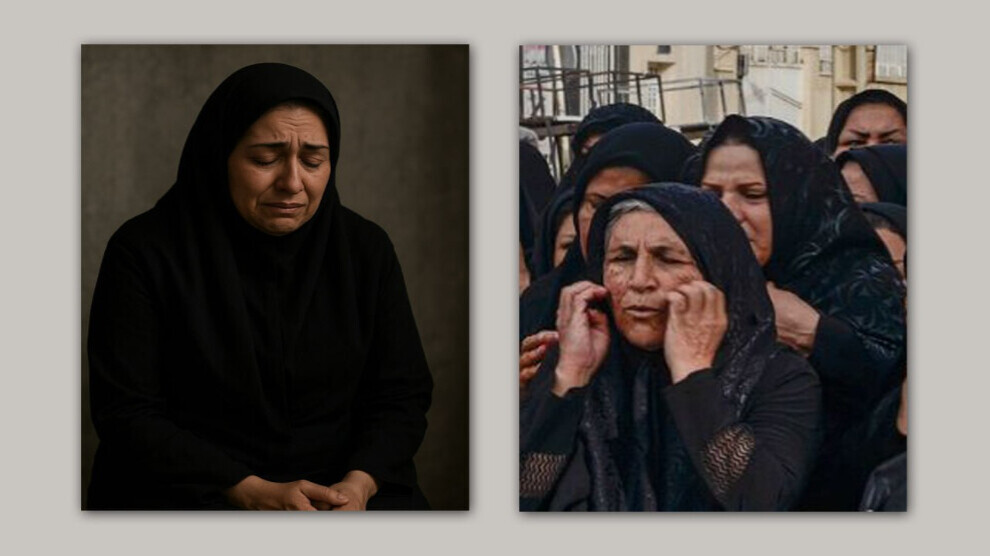In Iran, women are being forced to endure "endless mourning" after their spouses die!
Patriarchalism deepens gender inequality, limiting women's lives to "mourning" and "sacrifice" after the death of their spouses, while men are socially considered normal to overcome this process more quickly and return to normal life.

NESIM AHMEDÎ
Kermanshah - In Iran, stereotypes based on gender roles lead to women and men being treated completely differently in similar situations. While men who lose their spouses are socially encouraged to remarry, women are defined by "loyalty" and "sacrifice," turning remarriage into a social taboo. In this patriarchal order, where men are raised to be unable to meet even their most basic needs, women are assigned a role of mere servants. This approach diminishes women's rights and further deepens gender inequality.
A woman who has lost her husband is being ignored for her right to remarry.
Mahnā Q., a social worker in Kermanshah, highlighted the pressure placed on women by the patriarchal social structure, stating that in communities dominated by a male-dominated culture, women are still viewed as mere servants of their husbands. Mahna Q. said, “In this culture, women are seen as having the primary duty of meeting their husbands’ needs and serving them. The right of a woman who has lost her husband to remarry is ignored by society. A woman is seen as having to remain faithful to her deceased husband for life. Like a soldier, she is expected to remain loyal to her deceased husband and live her life in black and in a constant state of mourning.”
‘Social expectations between genders are skewed’
On the other hand, Mahna Q. stated that social norms operate completely differently for men in the same situation, saying, “When a man loses his wife, he is often expected to remarry within a short period of time. This is because he is perceived to need a new woman to meet his personal needs and take over the household chores.” Mahna Q. emphasized that this inequality stems from a deeply rooted patriarchal mindset that prioritizes men's well-being over women's individual rights and feelings. She said, “When women are grieving, society can force them not to consider marriage. Yet, for men, remarriage is almost considered normal just days after their spouse's death. This demonstrates how distorted social expectations between the sexes are.”
Today's social expectations for widowed women are often viewed as a modern reflection of the ancient Indian "Sati ceremony." At that time, women were forced to throw themselves on funeral pyres to show their loyalty to their deceased husbands. Today, a similar understanding holds that women are expected not to remarry after their husbands' deaths, to limit their social lives, and to mourn for extended periods. The concept of "fidelity" is still defined by women living alone. This mindset disregards women's individual right to life, forcing them into silence and loneliness through social pressure.
A woman in her forties from Kermanshah described the cultural pressure she experienced after her husband's death: “During my husband's funeral, the women in my family prevented me from cutting my hair as a mourning ritual; they wanted my hair to grow long and my grief to be visible. They would scratch my face with their nails to leave mourning marks on my face. They would take soil from where my husband was buried and pour it on my head, and I had to wear black for a week. Almost 10 years have passed since my husband's death, but I still don't wear anything but black. I don't even go shopping because I believe my life as a woman who has lost her husband is over. I have to mourn until I die. In our culture, a woman's life effectively ends when she loses her husband. But the same isn't true for men. My brother-in-law's wife passed away two years ago and remarried shortly thereafter.”
Speaking to our agency on the subject, women's rights activist Sehila S. stated that in societies where patriarchal values prevail, women who lose their husbands are excluded from social life. “In such a social structure, the presence of a male figure alongside a woman represents her ‘legitimacy’ and ‘existence.’ A woman who loses the person she shares her life with suddenly loses her entire social identity and visibility,” said Sehila S., adding that this situation points to a profound inequality in which women’s personal existence is not recognized.
"Women are almost ignored"
Sehila S. emphasized that it is unacceptable for a woman's individual value to be defined solely by a relationship or family ties, saying, "Women have the right to build an identity and a life independent of their husbands. However, unfortunately, in some social circles, women are virtually considered 'non-existent' in the eyes of society after losing their husbands. Women who want to stand on their own two feet are not even given the right to build a new life."
